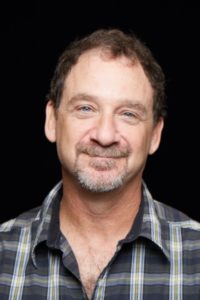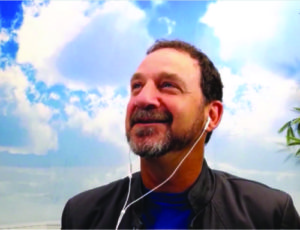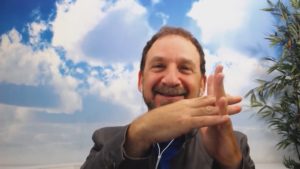Today SevenPonds speaks with Dr. Michael Fratkin, palliative medicine specialist and president and founder of ResolutionCare. Birthed by Dr. Fratkin’s desire to expand palliative care beyond the limitations of our country’s broken healthcare system, ResolutionCare is a telemedicine project that uses videoconferencing technology and an interdisciplinary team to provide remote palliative care to patients in need.

Credit: doctorpreneurs.com
Ellary: Would you first of all speak a little bit about your background?
Dr. Fratkin: My name’s Michael Fratkin, or Dr. Fratkin. I’m a dad and a husband and a brother and a son, and I’m also what’s called a palliative medicine doctor. I focus on two things. One is the treatment of symptoms (pain, nausea, etc.) Secondly, I help people and their families navigate their way through what are often very complicated and always very hard medical situations.
The patients we care for are seriously ill. They are generally people with life-limiting illnesses, people that are close to finishing their lives. There’s a lot going on –a lot of burden on their personhood while they try to extract value out of our very screwed up health care system.
Ellary: So can you describe what palliative care is?
Dr. Fratkin: The Center to Advance Palliative Care has a definition that I will probably butcher, but basically it defines palliative care as whole person care — actually whole system care for the person living with serious illness and the people who care for them. Its aim is to improve quality of life, to empower the person to be in charge of their own destiny, to provide support to them, and to help them live. It’s not sustainably done by any one provider or any one kind of discipline. It’s a team-based approach with doctors, nurses social workers, chaplains…all integrated in a transdisciplinary way to see things from multiple angles, but always centered on the whole person involved.
Ellary: So how did you come to this work? What got you interested in it or how were you led to it?
Dr. Fratkin: I’ll give you the highlights. When I was a kid, my grandfather died. I remember walking down the aisle to where they had the casket open and looking in. And I just had this flash of insight, looking around at all these people, that there’s a secret here that nobody’s acknowledging — that he’s actually not there in this body of his. I looked at him and there was his body, but he was so not there. That was the moment I realized that we’re not our body.
Then over time, I realized we’re not our body or our mind. And then of late, I’m sort of awash in the awe of the fact that we are our bodies, our minds and something else. And that “something else” is at the heart of everything we are and everything we do and all the connections we make and all the love we put together and all the craziness we create.
I found my way through life. I was a vagabond, a skier, a rock climber — I wasn’t on any beeline to medical school. But then when I went, I found out that I really wanted to work with people who were dying.
Ellary: What was interesting about the dying process or working with dying people for you?
Dr. Fratkin: I feel like I could have been just as into birth. If I was a woman, I think I would’ve been a midwife. But the idea of being right there watching when a being crosses into nonbeing. Or when nonbeing cross into being…
Ellary: There’s nothing realer than that.
Dr. Fratkin: Nothing realer! And I needed things to be real. So I was interested in hospice even as I emerged into the clinical training process. Then I got interested in AIDS work because of the historical timing. I went into chemotherapy and disease-centered care because we did such a good job of creating technologies to serve those people and push back against the virus. I was really good at that for a while, and then I just let it go because it didn’t quite take me where I wanted to be.

Credit: resolutioncare.com
Ellary: On a spiritual level?
Dr. Fratkin: On a spiritual level. Getting to do palliative care, there’s a lot of magic and theater that’s occurring as human beings decouple themselves from everything that they thought was real and true that’s now slipping through their fingers. Pretty amazing and interesting things happen, and one thing that happens quite a lot is that people heal. Wounds and psychic dilemmas just evaporate in the face of something so real as death approaching. Another thing that happens is that families do all sorts of theatrics and there all sorts of opportunities to be kind, and direct people or offer people an alternative to messing up their family even worse. If you can keep your head level and your heart open, there are a lot of opportunities to be useful.
Ellary: You now run ResolutionCare, an alternative to conventional palliative care services that brings together an interdisciplinary team to offer remote palliative care services via videoconferencing. What moved you to want to create an alternative to conventional palliative care?
Dr. Fradkin: In our society, most palliative care doctors are functioning as specialty consultants in hospitals. But it doesn’t take much of a leap of insight to realize that you’ve already failed if the patient shows up at the hospital. That means that they’ve had an experience of great distress, and if you look at what gets them into the hospital, quite a lot of the time it’s avoidable. You can anticipate needs and changes and transitions.
So there’s a great deal of interest now in the person-centered perspective, to try and move care out of the hospital. One way to do that is to open up a clinic—which is simply a mini- hospital. The patients come to you, shlep themselves to you and are greeted with a clipboard and then they sit around in a waiting room. Then they see a doctor who treats them impersonally, and the whole thing is just a miserable experience.
So I did that for a few years. I started an oncology clinic, and I provided good care. But I recognized how difficult it was for someone who was, say, 70 years-old with metastatic cancer to come to the clinic to get pain control. I also couldn’t scare up the amount of resources I needed for the demand that was created. I couldn’t see even one-fifth of the patients that were asking to see me, and I felt that like a real weight. So I was getting ready to leave my little town in Humboldt County out of frustration and burnout. Then I came across the videoconferencing tool called Helpouts through a friend that worked at Google, and the vision for ResolutionCare began.

Credit: youtube.com
Ellary: What is the origin story of ResolutionCare, as it developed beyond your initial experiments offering advice on complex illness via the Helpouts videoconferencing platform?
Dr. Fratkin: I discovered something called Project Echo from the University of New Mexico. Project Echo is a learning model that uses video conferencing as a way of spreading or democratizing, or
open-sourcing scarce expertise. My expertise is rare, and there are definitely not enough inspired teams to take care of everybody that’s out there. And there are a lot of primary care people and mid-level practitioners at community clinics all over the place who would benefit from knowing what I do — for example, the three things I focus on in terms of pain control, or how I talk to people about advanced care planning or pulse storms.
So I decided to try crowdfunding an end-of-life care team that used telemedicine and Project Echo to both take care of more people than they possibly could otherwise, and to teach other practitioners how to take care of themselves and their own patients. On Nov. 1, 2014, I launched a crowd funding campaign, and by December I’d raised $150,000. Then in January of last year I walked into this office space with Leanne, our administrative coordinator, and we started ResolutionCare.
Ellary: Who are some of the core members of your team?
Dr. Fratkin: Right now we’ve got myself, three nurses and a nurse manager. We’ve also got one social worker, and we’ve just hired another one. We’ve got a very funny and amazing chaplain and three community health workers, and I just recruited an additional fellowship-trained hospice medicine doctor. In addition to that, we have a three-quarter-time social worker in the hospice program at our community hospital. Then we’ve got seven or eight operational people and a couple of interns.

Credit: singularityweblog.com
Ellary: Now you use Zoom as your videoconferencing platform for meeting with patients. In fact, we’re using it right now. So, I am seeing you the way a patient would be see you, right?
Dr. Fratkin: Yes. You’ve interviewed by phone haven’t you?
Ellary: Yes.
Dr. Fratkin: This is different. We’re much more engaged. We’re literally framed to be attendant to each other. And you get to be in your own comfy little zone, and so do I. It’s a change in the power structure.
I often ask patients to show me where they keep their medicines and how they organize them. And they can show me that, and I can see that it’s, for example, this big bin of conflicting crazy medicines that they don’t have very well organized. So I can send a nurse out, or put a nurse in touch with them so they can help organize the medicines.
Ellary: You get a lot of information that you would never have access to without the patient being in their own spaces, where they are existing on a day-to-day basis with their illness.
Dr. Fratkin: For sure. If a doctor comes over to your house, for a lot of people that’s a big deal. People want to impress you. They get all dressed up; they vacuum; they get all wigged out. But this way I have the benefit of just dropping in and bringing the service to them without invading their space and creating that whole world of anxiety. Compared to the experience of a patient schlepping their broken body to the clinic, or getting their daughter to take a day off work, or driving 60 miles in a rural part of the world, video conferencing is hugely superior to real life.

Credit: doctorpreneurs.com
Ellary: So currently, how are you receiving funding?
Dr. Fratkin: The old model of paying for healthcare is that you get paid more for doing more stuff to people. That’s called fee-for-service. The other way of paying is called value-based payment. A value-based payment structure is about outcomes. It’s about improving the patients’ quality of life by providing them everything they need inside the realm of palliative care. It’s not based on some checklist: The nurse has to visit once a week; the doctor has to see the patient every three weeks; the chaplain has to…etc. That’s just metrics, data, and it’s built on this antagonism between the health insurance company and the provider. If you’re a health insurance company, it’s fundamentally decreasing your utilization by giving the patients an alternative to high-cost, low-value interventions driven by the fee-for-service model. The amount of money wasted that way in the system of delivering the opposite of value to people is enormous.
So health plans, and ultimately government agencies, are recognizing that they’ve been wasting a whole lot of money on the very ill while making them worse instead of better. But palliative care is an intervention that makes people better and saves money. So, we’ve got contracts now with a couple of public plans — managed care organizations that provide us a per-month amount to do whatever makes sense to do for each person. We also have a contract with a private payer, and about half of our patients are on Medicare. And because we’re a community-based organization, we’re not going to say no to people, so we make it work. We’re trying to build out the contracts that come to us, get a few grants here and there, and we hope to continue.
We do what we have to do because taking care of your community is what’s important. With a little luck, we’ll have a revolutionary transformation in health care, and in five or 10 years, half of healthcare will be done this way.
Ellary: Thank you, Dr. Fratkin. It’s been a pleasure speaking with you.

 How Do You Create An Alternative To Conventional Palliative Care?
How Do You Create An Alternative To Conventional Palliative Care?


 “Help Me, Helen”
“Help Me, Helen”
 Recovering Cremation Remains After the Los Angeles Fires
Recovering Cremation Remains After the Los Angeles Fires
 “As Tears Go By” by Marianne Faithfull
“As Tears Go By” by Marianne Faithfull














